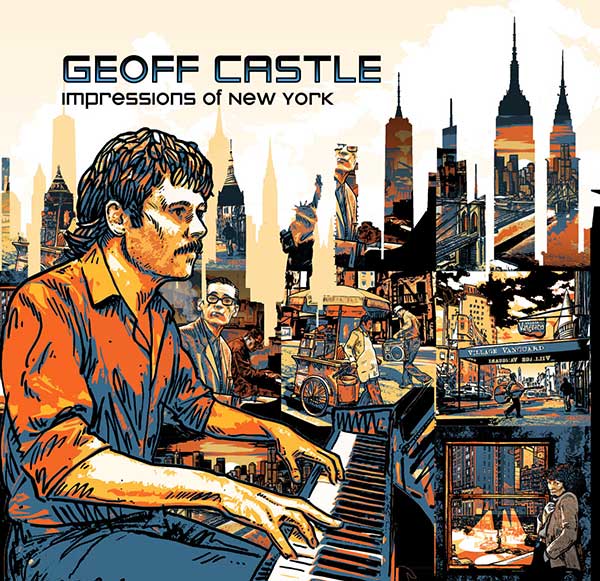
Impressions of New York, Geoff Castle (Jazz in Britain)
Ah, the music of the early 1980s. Punk had subsided, progressive rock was feeling subdued and a bit sorry for itself, and jazz and improvisation carried on regardless with only the occasional flirtation with major record labels or their publicity and hype department.
You were far more likely to find jazz in your local pub, at the Bull’s Head pub in Barnes, Ronnie Scott’s in Soho, or at events which were part of Camden Jazz Week or the Ealing Jazz Festival, where the majority of this double CD’s music was recorded by Geoff Castle’s Impressions Orchestra, a large band which included well known musicians such as Ian Carr, Tim Whitehead, Dick Pearce and Guy Barker, many of whom Castle played alongside in bands such as Nucleus, Paz, Graham Collier Music and Neil Ardley. (Or recorded with – Castle was even on Ian Dury’s New Boots & Panties!! album.)
Castle was a superb keyboard player, able to make use of organ, electric and acoustic piano, as well as synthesizers, whether rocking out in jazz rock mode with Nucleus, coming over all Latin mood with Paz, or being progressive and mystical with Neil Ardley. He was also a fantastic composer, as evidenced here, with the ‘Impressions of New York Suite’, which was a commission for the 1980 Camden Jazz Week, played in part live at The Roundhouse.
The complete suite constitutes the whole of CD2, and is from the 1983 Ealing Jazz Festival. It feels better paced and inhabited by the band than CD1, with five tracks, mostly in much longer versions, being present. ‘Waltz for Bill’, dedicated to the piano player Bill Evans, is the third and middle track here, providing a breathing space for the listener, and following on from a brisk version of ‘Village Vanguard’ which features a somewhat surprising synthesizer break.
The music is mostly what you’d expect big band jazz of the 1980s to sound like. That’s not a criticism just a fact. There are subtle electronic and/or keyboard textures and additions here and there but in the main we are in a post-bop meets jazz-rock world. The opener, ‘Manhattan Dawn’, does what it says, moving from quiet keyboard to flute to bigger and more complex sounds as the city wakes up and the full ensemble gradually joins in.
If it is slightly reminiscent of The Moody Blues’ ‘The Day Begins’, then ‘7th Avenue South’, which follow on from the Bill Evans hommage, is a take on The Brecker Brothers’ type of jazz-funk, here used to evoke street life in Downtown Manhattan. There’s lots of relentless bass, horn solos, and musical crescendos, before the moody ‘Streets at Night’ closes the set. This is big band jazz at its best: it swings along, constantly varying the textures and instrumentation, the brass subsiding behind a glorious electric guitar solo with congas, then vibraphone and superb percussion and what I take to be electronics, before the whole band reassemble and bring things to a halt.
The first presentation of the suite at Camden supplies the first four (of seven) tracks on CD1, which is supplemented by 3 tracks recorded ‘live at a session in London, 17 April 1983’. Two tracks which only appear on the first CD – ‘Riding High’ and ‘Demon Dance’ – are somewhat strangely wrapped around a version of ‘Waltz for Bill’; it’s odd that the track wasn’t moved to be part of the suite.
Some of the music on the first CD feels a little tentative, even stilted. ‘Manhattan Dawn’ takes far too long to get going and then ends too soon after it does. ‘Village Vanguard’ is brisk and workmanlike and far too reminiscent of bad pub jazz, particularly in the vibraphone department, and the synthesizer solo here is weedy and halfhearted. ‘7th Avenue South’ lacks the funky punch of the later version and sounds more Grover Washington Jr. than Brecker Brothers, but I do like the slower and more formal ‘Streets at Night’ here, which has some great sax playing and something bizarrely flanged (or otherwise treated) in the background.
The sound subtly changes for the three live session tracks. ‘Riding High’ feels like a jazz band going through the motions, as does ‘Waltz for Bill’, although I like the brief guitar which is featured at the beginning, as well as the fact that this version stretches out a little more. ‘Demon Dance’, the other non ‘Impressions of New York’ track, is great, with plenty of space for solos and relaxed instrumental conversation. The keyboards from around the seven-and-a-half-minutes mark are simply superb, as is the ensemble’s re-entry almost two minutes later, and their conclusion to the piece.
Overall this is an enjoyable, if slightly nostalgic, double album. It feels like music that has chosen to ignore much of what was happening in London and New York at the time or a few years previously. I confess I find it a little too safe and careful; it makes me long for some post-punk, No Wave or improvised music in the mix along with the ‘jazz’. I know, as I made my first visit that year, that 1980 Manhattan was a much more dangerous and exciting place than Geoff Castle’s Impressions suggest.
.
Rupert Loydell
You can buy the digital download or double CD here.
.
